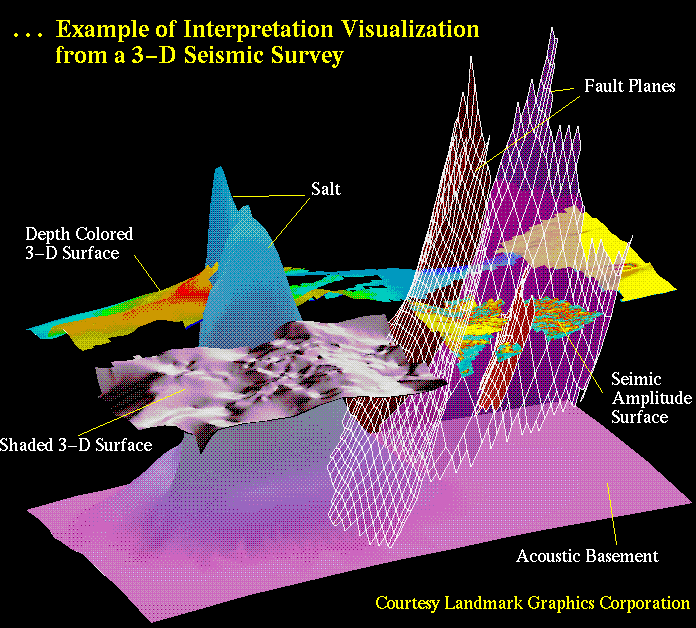VECtor's primary strategic objective is
to establish a mechanism in which geotechnical
Registered Experts utilize their Oil and Gas Industry contacts to
explore complex spatial relationships and effectively communicate
interpretation results to their senior management.
"4-D" seismic is a specific example of a new technology in the
enhanced recovery portion of the industry which is hard to present.
This technology is based on collecting multiple 3-D seismic surveys over
the same location, and then differencing the surveys to study fluid
movements. Based on field tests in Europe and the Gulf of Mexico, this
technology will become very significant in use over the next few years.
The VETL is ideally positioned to assist in communicating how spatial
relationships change through time. There are literally N-dimensional
components to the data used in exploration and production, components at
many different scales, and yet all tied to a specific location.
The potential of VECtor is to
synergistically and uniquely explore, unravel, and present
interpretations of complex spatial relationships. In the Oil and Gas
Industry, exploring data in a virtual environment will allow evaluation
of risk tolerances and setting optimal strategies at each stage of
prospect inventory management; specifically including:
Making better decisions in the Oil and Gas Industry usually results
in a gigantic positive financial impact. It is probable that VECtor will be able to financially participate in the success that
a company has in developing an already existing field, based on
decisions that could not have been made without using the virtual
environments available through VETL. A specific example that has been
discussed with a small oil company representative has to do with
presenting and assisting in selling a prospect to other oil companies.
The company that was approached is in the final stages of selling a
prospect in The Netherlands. When the well spuds in November 1995 the
company selling the prospect will make a $10 million profit, whether the
well is successful or not. If the well is successful, the potential
income is enormous. A similar size structure in the neighborhood
required $550 million in facilities and had an 11 month payout. The
company representative to which the VETL was described felt it entirely
reasonable to provide an override for assisting in selling this kind of
prospect.
It is the next logical step, beyond the existing
state-of-the-art in virtual reality technology, to solve economically
significant technical problems. Where is there a better place to find
these kinds of spatial distribution problems than in Houston, Texas -
with the key industries of oil, medicine, and space exploration? The
image below gives an example of the current state of the art in
presenting seismic interpretation results. VECtor
will open a whole new world of ways to interact with data and optimize
decision making - the next step beyond innovations pioneered by Landmark Graphics Corporation.

 return to Walden 3-D, Inc. Home Page
return to Walden 3-D, Inc. Home Page